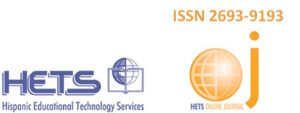Home
ISSN 2693-9193
Welcome!
HETS Chair Message
As Chair of the Hispanic Educational Technology Services (HETS) Consortium, I am pleased to announce the publication of the 2025 Fall Issue Volume XVI of our peer-reviewed HETS Online Journal (HOJ). We invite you to access the publication on the editorial platform available from the HETS website (hets.org/ejournal/), and its dedicated editorial platform at HETS Online Journal.
This issue showcases nine new articles, seven in English and two in Spanish, consistently focusing on innovative research, scientific papers, and best practices in topics related to higher education with a globalized perspective. HETS invites you to enjoy the articles on this Issue and share the Journal with colleagues, academics, students, and administrators involved with higher education.
Among the topics, you can find articles discussing: Perceived Online Teaching–Learning Environment as a Predictor of Student Satisfaction; Shaping Problem-Solvers: The Role of Diverse Methods in Advancing Mathematical Confidence; Academic, Social, and Emotional Impacts of COVID-19 on University Students in Puerto Rico; and Engaging, Motivating, and Strengthening Learning Preferences with Kahoot! in Higher Education.
This Journal, created in 2010, provides high-quality research articles in English and Spanish, covering online teaching, learning, and training topics for the academic community around the world. HETS encourages all those interested in publishing their articles to take advantage of this opportunity to share their knowledge. The deadline for submission of articles for our next Spring Issue Volume XVI is March 16, 2026.
Finally, we welcome our new Co-editor, Dr. Kenneth DiLorenzo, and new reviewers Dr. Naydeen González-De Jesús and Rolando Méndez. We truly appreciate their collaboration and support tour Journal. We invite you to join HETS collaborators as reviewers. If you are interested, please send an e-mail to info@hets.org.
We hope you enjoy this Fall Issue!
Best regards and happy Holidays,
Gladys Nieves, P.E.
HETS Chair
President, EDP University
You will now be redirected to the new dedicated platform at the HETS Online Journal.
Editor’s Message
Greetings!
We thank you for viewing the Fall 2025 edition of the HETS Online Journal and hope that you will find inspiration from the articles shared here by your colleagues. Some articles are written in English, while others are written in Spanish.
This edition of the Journal begins with an article entitled “Gamification and Student Retention in Virtual Courses: Evidence from Language Teaching Practice,” which examines how gamification tools can enhance engagement and persistence among online Spanish students. Four tools—Kahoot, Quizlet, Gimkit, and Quizzes—were integrated into asynchronous and synchronous activities in online Spanish courses. Data from Learning Management System (LMS) analytics and student feedback surveys were analyzed descriptively to assess engagement trends.
The article “Competencias profesionales para enseñar en entornos virtuales, de maestros de matemáticas de los grados 9 a 12 del Departamento de Educación de Puerto Rico,” presents research that studied the level of self-perceived professional competence of mathematics teachers in grades 9 to 12 to teach in virtual learning environments.
“The Adverse Digital Childhood Experiences (ADCEs) Framework: A Transformative Paradigm for Decoding Digital Adversity and Safeguarding Human Agency in Child Development and Lifespan Trajectories,” explores the Adverse Digital Childhood Experiences (ADCEs) framework, an empirically informed and theory-driven extension of ACEs that systematizes ten interrelated domains of digital adversity encompassing social, cognitive, and environmental stressors.
The article “Perceived Online Teaching–Learning Environment as a Predictor of Student Satisfaction: Evidence from a Spanish Course” discusses the relationship between students’ perceptions of the online teaching–learning environment and their satisfaction with a Spanish language course at a private university. Using a quantitative, correlational design, the study analyzed student survey responses adapted from established online learning environment scales to capture instructor support, student interaction and collaboration, personal relevance, authentic learning, active learning, student autonomy, and enjoyment of distance education.
“Shaping Problem-Solvers: The Role of Diverse Methods in Advancing Mathematical Confidence” is an article that investigates how exposure to diverse methods for solving quadratic equations influences the development of mathematical confidence and problem-solving skills among undergraduate students in community college algebra courses.
In “Generational Cybersecurity: Helping Parents Understand Teens’ Online Risks,” parallel surveys of parents and adolescents were used to examine intergenerational understanding of teens’ online activities and risks. Findings highlight gaps in knowledge and communication that can be addressed through family-based education and structured workshops.
The results highlighted in the article “Academic, Social, and Emotional Impacts of COVID-19 on University Students in Puerto Rico” state the urgent need for Puerto Rican institutions of higher education to strengthen remote learning support systems, mental health services, and crisis resilience policies.
In “La importancia de los planes de inducción para docentes de enfermería en Puerto Rico: hacia una educación de calidad,” the significance of induction initiatives for the preparation and retention of nursing faculty is explored, comparing practices in accredited and non-accredited institutions.
Finally, the authors of “Engaging, Motivating, and Strengthening Learning Preferences with Kahoot! in Higher Education” present a practical framework for using Kahoot! to boost motivation and engagement, and help students surface and strengthen their learning preferences through metacognitive reflection.
As always, we hope that this issue of the Journal provides information you can apply at your institution, and perhaps that you will be inspired to further these studies and add to the body of knowledge.
We wish you a wonderful holiday season and look forward to seeing you back here in the new year!
Pamela A. (Krauser) Vargas
HETS Online Journal Chief Editor
Director, Research and Grant Development, Southeast Missouri State University
You will now be redirected to the new dedicated platform at the HETS Online Journal.








